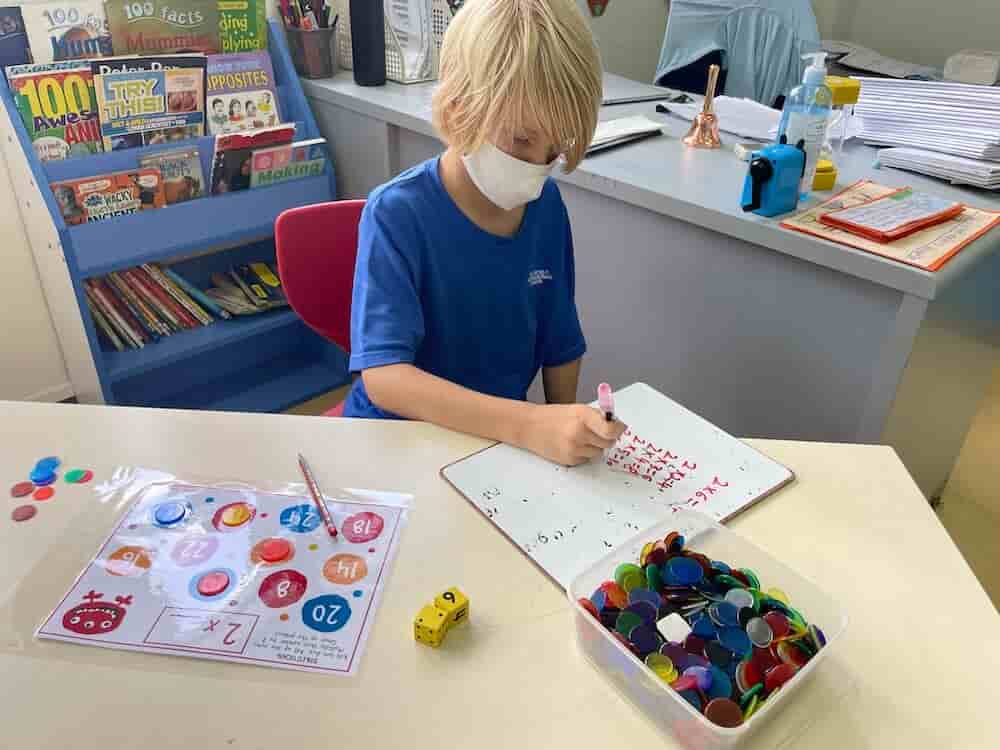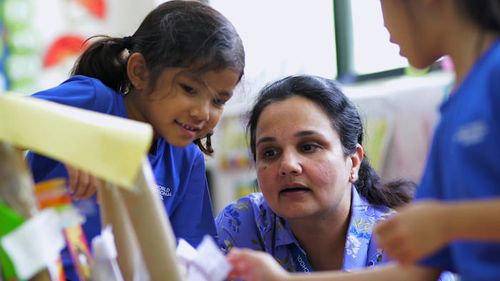Mathematics is a subject that students should build upon and master throughout their educational experience, as it forms a strong foundation for understanding how the world works and is a critical skill for 21st-century learners.
In the OWIS Primary Years Programme, students are exposed to mathematical topics in their everyday learning through the units of inquiry. This allows them to make important connections between these mathematical concepts that they are being taught and the real world in which they live. Maths is all around us, so it is key that students are able to grasp these skills and understanding from a young age. It is also important that they feel supported through learning and are taught to work through processes to come to an answer.
As Olga T., parent of a primary school student, puts it, “My son talks about his school life a lot, from the time spent with his friends to how interesting his Maths lessons were!”
About the PYP Mathematics Curriculum
In the PYP, children are introduced to mathematical concepts such as data collection and handling, space and shape, measurement, patterns, numbers and functions, which can be used to build a foundation for higher-level thinking in future years.
Once these concepts are mastered, PYP students are then introduced to broader mathematical concepts that require them to think critically about how they can be applied in a variety of settings.

Making Meaning Out of Mathematics
At OWIS, our educators understand that students need to be engaged in the learning process in order to fully grasp the concept that is being introduced. While previous generations may have spent hours memorising fact tables and reiterating their knowledge to their instructors, the 21st-century learners at OWIS are provided with interactive mathematical lessons that engage them and allow them to make meaning out of mathematics concepts.
In the PYP, manipulatives or hands-on tools and resources are often used to provide younger students with a physical representation of mathematics. This also helps those students who may find practical learning much easier than reading or memorising. Teachers may also use play as a form of learning, for instance asking students to work in groups to set up a shop in the lesson, tasking them with formulating the best way to use their money to purchase the goods they need. These manipulatives help students visualise and make important connections to develop a deeper understanding. It also teaches them how to take mathematics out of the classroom and into the world around them. It encourages them to get involved when they are at home, or out doing activities, and teaches them that mathematics can be seen in such a range of areas.
View these photo galleries of Maths Morning 2021 and Maths Day 2020 for more examples of how students at OWIS enjoy Maths games and activities to learn concepts.
Applying Concepts and Techniques with Real-World Connections
The most critical component of the PYP mathematics curriculum is providing children with opportunities to apply the mathematical concepts that they have learned in real-world situations.
Students participate in dynamic activities that allow them to make connections, apply their knowledge and showcase their work. For example:
- Children create and participate in interactive presentations where they must showcase their conceptual understanding and be open to constructive feedback from their classroom community. Ultimately, this type of application and engagement will prepare them to combine creativity, critical thinking and mathematical knowledge in the future.
- Children will demonstrate their work and justify their process to the other students in the classroom. This helps them develop their public speaking skills while simultaneously learning to accept constructive feedback about their work. It is an activity that increases their maths understanding while also building their confidence.
Preparing for a Global Marketplace
The difference between the OWIS PYP mathematics curriculum and the curriculum offered at other schools is that it prepares students for success in the global marketplace by encouraging them to think creatively about mathematical problems. Their critical thinking skills evolve throughout the course of their education, and they learn how to apply their foundational knowledge in a variety of scenarios. This is a 21st-century skill that is in very high demand across the globe, and one that can be taken into every career and life experience.
At OWIS, our goal is to create lifelong learners who can succeed in the competitive 21st-century economy. As the economy continues to rely on digital advances and technological resources, it’s anticipated that future leaders will need to have a deep understanding of complex mathematical concepts and how those concepts apply to the world around them. Students who have a strong mathematical foundation and who are experienced with inquiry-based learning will be able to come up with the innovative solutions that are needed for the world today. They will also be at the forefront of new developing careers which are evolving in today’s world with the advancement of technology. Many new technologies centre on the use of mathematics and are constantly progressing. By making our students passionate about mathematics and helping them understand the wide range of areas in which their skills can be used, we hope to encourage them to continue developing these skills throughout their careers. We also ensure that we support them as they progress through the more complex aspects of study. By encouraging a love for mathematics from a young age and throughout their education, we make certain they are ahead of the game.
For more information on mathematics on the PYP, please Contact Us today, or to Book a Campus Tour.
(This blog was originally written in collaboration with Ms Sebrina Loh, former Primary Maths Coordinator, OWIS Nanyang.)














